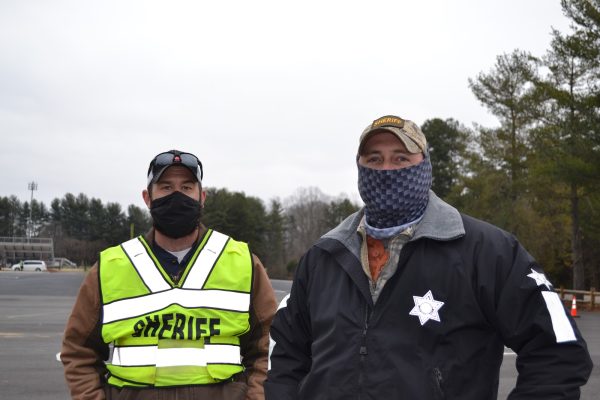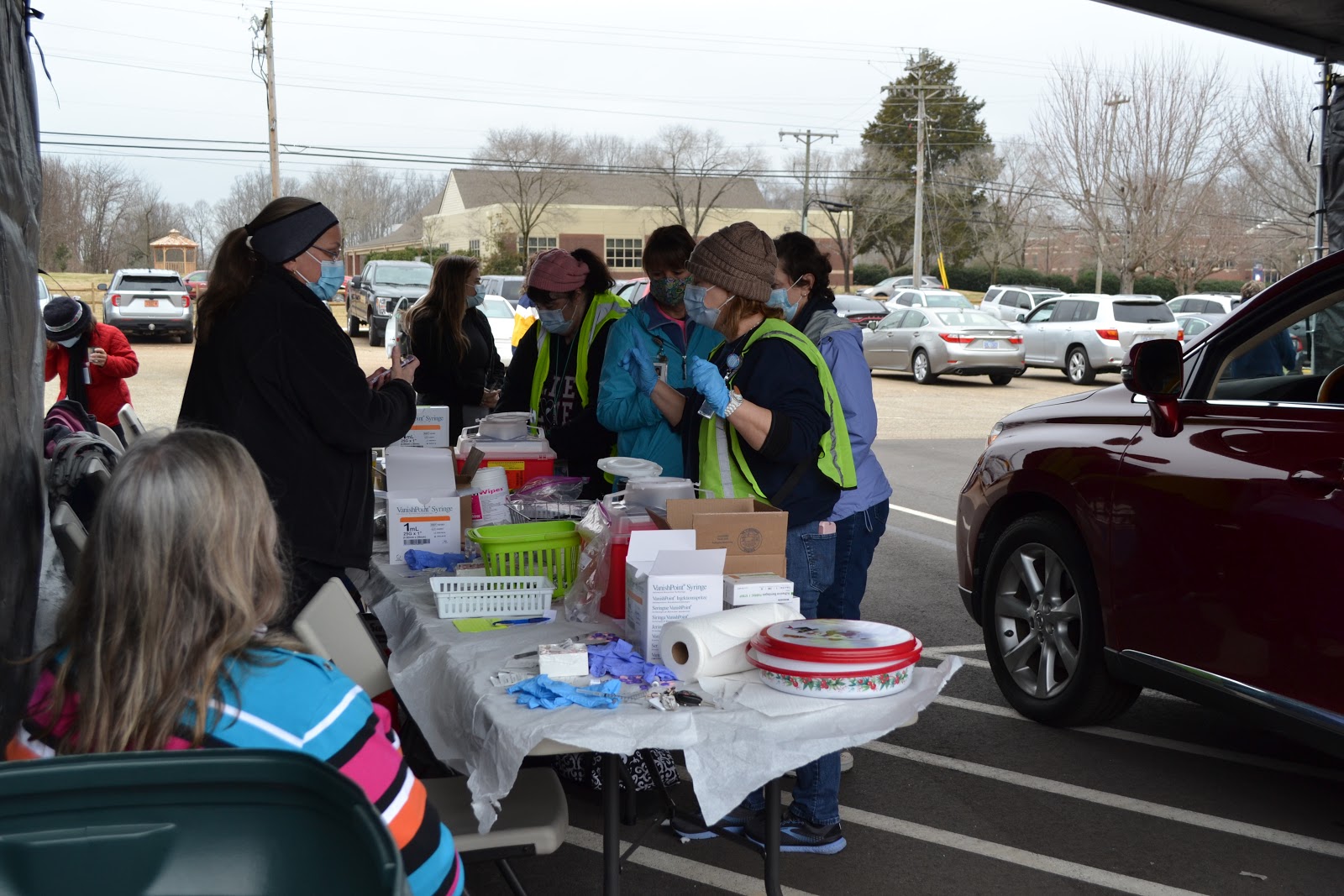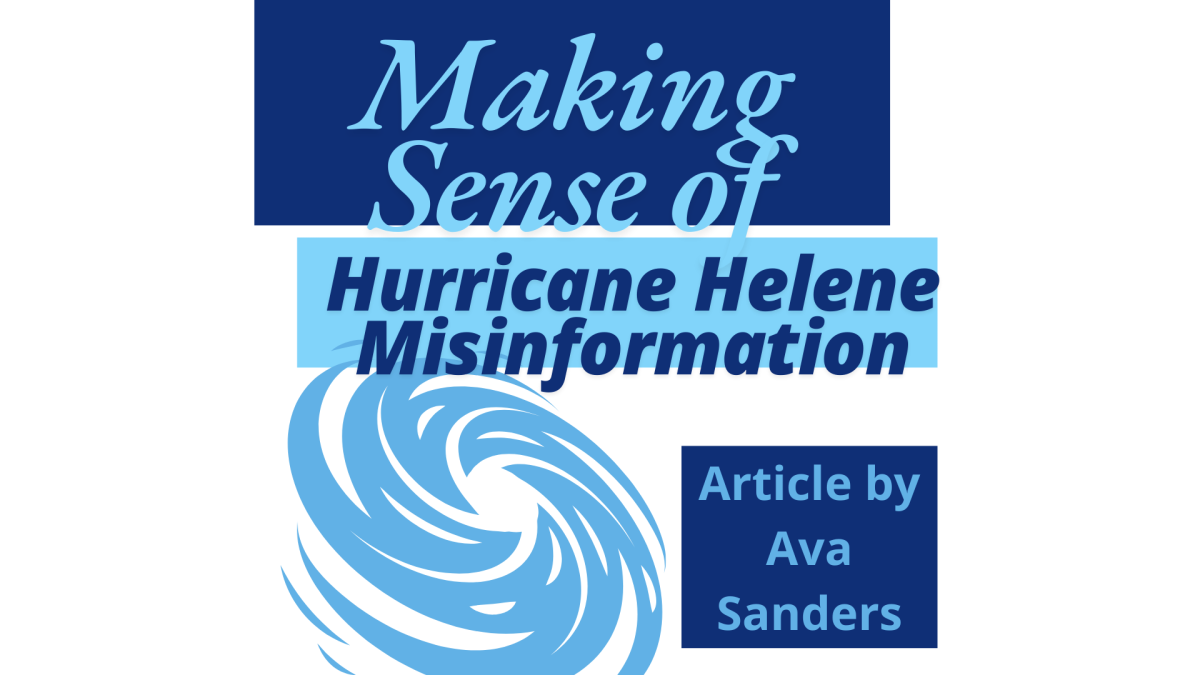On Friday, January 15, the Davie County Health Department hosted its fifth COVID-19 vaccine clinic at the Davie County Community Park. Frontline healthcare workers and people aged 75 and over lined up outside the park to receive their first dose of the treatment. The clinic was held solely outside, with two tents set up for nurses to administer doses. Patients did not have to exit their vehicles while they were at the event.
Since the January 15 event, the Davie County Health Department has planned for six second-dose clinics and is continuing first-dose treatments. The second-dose clinics started on Wednesday, January 20, and will continue being hosted until February 24. The most recent first-dose treatment was on January 22 and subsequent distribution will be held on Fridays from 10 am to 2 pm. On January 29, however, the event will be on a first-come, first-serve basis, as the Health Department only has 400 doses to administer.
Currently, the vaccine groups being served in Davie County are Group 1, health care workers and long-term care residents and staff, and Group 2, older adults ages 65 and older, regardless of any health issues. In this system, there are 3 other groups: Group 3, frontline essential workers; Group 4, adults with underlying health conditions; and Group 5, everyone else.
Initially, however, the NC Health Department had different eligibility guidelines, meaning Davie County was able to offer vaccinations to those who would initially not be eligible to receive it. The old group guidelines included only four groups, with Group 1 split into healthcare employees and adults at the highest risk, Group 2 including other high-risk adults, Group 3 covering students and frontline workers, and Group 4 opening up treatment to anyone desiring it.
A consequence of the old vaccine group guidelines was a planned clinic for all Davie County Schools employees, regardless of age or health conditions. Even with the guidelines changing, the health department decided to go through with the clinic. On January 28, over 300 school system employees received a dose. The clinic was held at Davie High School for easy accessibility.
High school English teacher Matthew Barker was one of the many teachers who received the COVID-19 vaccine. “I chose to take the Covid vaccine because I am tired of seeing Covid spreading out of control,” Barker says. “The death toll is rising daily, and the number of people who have been infected with this virus is both inconceivable and unacceptable. If a vaccine can boost a 95% success rate in combating this virus, I am absolutely on board with taking my doses.”
When asked what he would say to those hesitant to receive the shot, Barker states, “Don’t look at the speed of the vaccine’s production as a reason to be skeptical of its effectiveness. Rather, regard it for what it is — the result of the best and brightest of humanity working together to combat a problem facing us on a global scale.”
He also elaborates on believing the media. “Who is telling you that the vaccine is not safe?” Barker says, “Are they a reputable source? If the majority of accredited news sources and the medical establishment at large are vouching for its effectiveness, why assume that they are wrong?”

Information about the COVID-19 vaccine
In light of the recent clinics held in Davie County, The Weekly Talon believes it is important for students and other residents to be well-informed. Read on to find out what is in the vaccine, concerns about side effects and performance, and how to separate the facts from fiction.
How does the vaccine work?
The Davie County clinics are currently distributing the Pfizer-BioNTech and the Moderna COVID-19 vaccine, both of which were approved for emergency distribution in the United States on December 11, 2020. The Pfizer injection has been faced with quite a bit of criticism as it uses new mRNA technology to provide immunity. The ingredients of the Pfizer vaccine are as follows:
- mRNA
- Multiple lipids
- Potassium chloride
- Monobasic potassium phosphate
- Sodium chloride
- Dibasic sodium phosphate
- Dihydrate
- Sucrose
The Pfizer shot is administered as a 2-dose series, 3 weeks apart, into the muscle of your arm.
Although the Pfizer vaccine is not fully approved by the FDA yet, many trials and tests were required to be conducted before distribution. In Pfizer’s clinical trials, approximately 20,000 individuals 16 years of age and older have received at least one dose to provide appropriate data and is estimated to be 95% effective. The side effects are:
- Pain at the injection site
- Redness and swelling
- Tiredness
- Headache
- Muscle pain
- Chills
- Fever
On December 18, 2020, the U.S. Food and Drug Administration issued an emergency use authorization for the Moderna vaccine to prevent COVID-19. The Moderna vaccine was the second vaccination approved for emergency distribution in the United States but has a different makeup than its predecessor from Pfizer-BioNTech. The Moderna vaccine’s ingredients are as follows;
- Messenger Ribonucleic Acid (mRNA)
- Multiple lipids (not similar to the ones found in Pfizer’s)
- Tromethamine
- Tromethamine hydrochloride
- Acetic acid.
The Moderna vaccine is an injection into the muscle of the arm in a series of 2 doses, 1 month apart, unlike Pfizer-BioNTech’s.
More like the traditional flu shot, Moderna has used mRNA from the SARS-Cov-2 strand of the virus to introduce the antitoxin into the body to fight the disease. In clinical trials, approximately 15,400 individuals 18 years of age and older have received at least one dose of the Moderna vaccine. Although its duration is unknown, it is estimated to be 94.1% effective.
Concerns About Side-Effects

Considering both vaccines are still being tested and refined, there are several concerns regarding their usage. Pregnant women, individuals with weakened immune systems, and individuals with a history of anaphylaxis are of the most concern.
The main thing to take into consideration with the following information is that there is little concrete data available right now, so parts of it may be subject to change as the treatment is researched more.
Concerns regarding pregnant women
Pregnant women are among the populations of citizens being carefully considered for their reactions to the shot. Pregnant women have a higher risk for contracting a severe case of COVID-19, along with other viral infections.
“Viral infections that specifically affect the lungs, like COVID-19, can make it more difficult for pregnant women to breathe… because of how the body changes during pregnancy, which leads to decreased lung volumes,” says Monica Lee-Griffith M.D, an obstetrician. COVID-19 could also cause complications such as miscarriages or preterm deliveries. The added risk makes it imperative that pregnant women are allowed to receive the shot.
While there isn’t enough data to definitively say if it is safe or not, the CDC has stated that it is likely safe for pregnant and breastfeeding women, according to Dr. Lee-Griffith. There have not been any cases of pregnant women having any adverse reactions. In addition to that, there is zero evidence that immunization can lead to infertility.
Concerns regarding individuals with weakened immune systems
In addition to pregnant women, individuals with weakened immune systems and/or autoimmune conditions have a much higher risk of developing a severe case of COVID-19, so it is important to determine if they can safely get the vaccine.
According to the CDC, people who suffer from weakened immune systems and/or autoimmune conditions may receive the COVID-19 booster, however, they should be aware of the limited safety data regarding both groups. Fortunately, the treatment does not carry a live strand of the coronavirus like intranasal flu shots. Regardless, exercise caution as some mRNA-based immunizations have been known to induce type I interferon immune responses, which could potentially exacerbate autoimmune disease. Those who suffer from Guillain-Barre Syndrome and Bells’ Palsy are advised of potential risks but there have been no reported cases to support the notion that the vaccine would be harmful to them.
Concerns regarding allergic reactions
Researchers are concerned that some individuals may experience anaphylaxis (an acute allergic reaction to something that the body has become extra sensitive to) after receiving the immunization.
According to Hackensack Meridian Health, “the mRNA COVID-19 vaccine should not be administered to individuals who have had a severe allergic reaction to any component of the Pfizer-BioNTech or Moderna COVID-19 vaccines.” There are only a few reports of severe allergic reactions, but the number is significant enough for people with allergies to remain vigilant when accepting the coronavirus booster.
Allergies to foods, animals, or the environment don’t affect your risk of anaphylaxis with the treatment, but those with such allergies should remain cautious. Get evaluated by an allergist or immunologist if you have a history of allergic reactions to any other medication, polysorbate (a component in the vaccine), or any previous dose of the mRNA COVID-19 vaccine. Everyone will be monitored for at least 15 minutes after receiving the injection, so any adverse reactions will be handled quickly and safely.
Misconceptions about the vaccine

Individuals currently deciding to receive the COVID-19 vaccine are worried about some misleading information and misconceptions. The largest concern is the short amount of time in which it was produced, and some possible steps that may have been skipped during the development process.
Though the vaccine’s development seemed to be short, recipients can be sure that the proper procedures have been followed to assess its safety. Dr. Katie E. Golden MD of the Mid-Atlantic Emergency Medical Associates notes as much in her article on the subject.
However, when taking into consideration the lack of known long-term side effects of the vaccine, it may be possible for new information about the vaccine’s side effects to emerge in the future.
Another concern for potential recipients is the contents of the injection. When the vaccine was first made public, many were concerned about the fact that mRNA was present. While it is true these vaccines include mRNA used to make the coronavirus “spike” protein (shown on right), the fallacy that the recipient’s DNA will be altered can be easily explained. The COVID-19 booster marks the first mRNA inoculation that is approved for human use. Such mRNA vaccines have been in development since the early 2000s. The booster also does not include any live COVID-19 cells; therefore, it would be impossible to contract the virus from it.
An important detail about the COVID-19 vaccine is the general lack of absolute knowledge. Because the vaccine had only begun testing in the late months of last year and is just now rolling out to most adults, there are many unknown details. For instance, The Washington Post has said that immunity from COVID-19 can’t be completely guaranteed after the injection is administered. Recipients should continue to social distance, properly sanitize, and wear masks when in public.
A misconception being discussed by many Americans is whether or not the vaccine is needed if a person has already had COVID-19. So far, no studies have shown that those infected with COVID-19 will receive immunity after they are healed. It is a proven fact that a person can be infected with the virus twice, which shows that COVID-19 antibodies may exit the body after a period that varies from person to person.
Overall, the crucial thing to remember when deciding whether or not to receive the COVID-19 vaccine is that information is still developing. The vaccine has been proven safe for general use, but that doesn’t mean that it has been proven safe for everyone.
The writers and researchers at the Weekly Talon stress that you exercise caution when determining whether or not the vaccine is right for you. Learn more about the COVID-19 vaccine here at the CDC page for the COVID-19 vaccinations.







